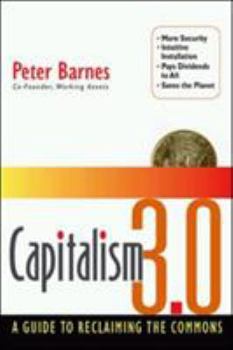Capitalism 3.0: A Guide to Reclaiming the Commons
Select Format
Select Condition 
Book Overview
Offer solutions to some economic, environmental, and social concerns. This description may be from another edition of this product.
Format:Hardcover
Language:English
ISBN:1576753611
ISBN13:9781576753613
Release Date:November 2006
Publisher:Berrett-Koehler Publishers
Length:195 Pages
Weight:1.10 lbs.
Dimensions:0.8" x 6.4" x 9.5"
Customer Reviews
5 ratings
The Beginnings of a Conceptual Framework for a New Economic System
Published by Thriftbooks.com User , 17 years ago
I have just read Capitalism 3.0 by Peter Barnes and am very impressed. Peter is a Georgist of the US variety although that fact is not immediately apparent as the book is written in a very light, non-ideological, non academic style. It is an extremely accessible and well written case for 'the propertisation' of the commons - emphatically NOT 'privatisation'. It does not discuss land value taxes/rents directly but places them indirectly within the context of all commons and proposes a solution to 'the tragedy' of all commons that, followed through, would nevertheless deliver LVT and something like a citizens income. Peter sees a need for a counterbalance to corporate power linked to private property, but not by State ownership and hence not by any measure that smacks of Socialism. Instead he puts forward the idea of many kinds of Trusts holding many kinds of commons property- from the GHG emisison rights to scientific knowledge to community land. Apart from the very essential job of supporting Commons Trusts and assigning property rights and legal protections to them, governments would thereafter stand aside. Governments would especially distance themselves from disbursing the receipts/rents/ licence fees collected for the use of the various commons as their susceptibility to corporate influence, according to Peter Barnes, is systemic and cannot be overcome. It is a very American approach - rather than intervening directly to regulate the power of an damaging but essential force, a countervailing force is introduced to dynamically re balance the system. A global Trust would be required to protect the atmosphere but this would not be given political power per se - but it would have significant economic power to balance the existing private sector influence of the WTO. This solution would satisfy libertarian, free market thinkers as it would not enhance the role of the State any more than that which it currently plays. Indeed many regulations would become unnecessary as social, cultural and environmental welfare would be intrinsically factored into ordinary business decisions. Of course all of this fits conceptually very nicely into the work Feasta has been doing for a Cap and (equal per capita) Share of green house gas emission rights. See www.capandshare.org for an update. What I think the idea really needs is another book entitled 'Socialism 3.0' that says more or less the same thing but from a European perspective. Together they could bookend a conceptual framework for an Earth and human friendly new economic system.
A fine roadmap for preserving capitalism's best features emerges.
Published by Thriftbooks.com User , 18 years ago
CAPITALISM 3.0: A GUIDE TO RECLAIMING THE COMMONS provides a strong critical eye on modern capitalism, which is rapidly destroying the heritage 'the commons' imparts to future generations. Our modern approach will lead to economic and social collapse, Barnes warns; but capitalism can be 'upgraded' by recapturing the focus on 'the commons' of future generations, and here he proposes an update that includes innovative changes to preserve the system for the future. A fine roadmap for preserving capitalism's best features emerges. Diane C. Donovan California Bookwatch
Clean, Clear Guide to the Commons
Published by Thriftbooks.com User , 18 years ago
Peter Barnes has long been one of the leading "working-theorists" promoting the commons. Capitalism 3.0 takes the theories advanced by people like David Bollier, Larry Lessig, Vandan Shiva, David Morris and distills them into an easy-to-read narrative format that build on Barnes' last work, "Who Owns the Sky?" The book is refreshingly easy to read for the genre, and is required reading for anyone who is serious about finding a new framework to organize around. It's way past time for us to rearrange our politics and regulation around a concept as robust as the commons.
A Brilliant Overview of the Commons and Economics
Published by Thriftbooks.com User , 18 years ago
Peter Barnes does a masterful job in re-imagining economics to take account of the commons, the shared resources that we inherit together and must pass along undiminished to our children. This book is lucid and highly readable as it deconstructs key flaws in conventional economics and proposes innovative solutions that protect the commons. Barnes is a former businessman (cofounder of Working Assets) and journalist, so he approaches the subject with sophistication and clarity. Barnes notes, for example, that conventional economics typically fails to account for the hidden subsidies that companies take from the commons (air, water, spectrum, public lands, federal R & D, etc.). Companies also use the commons as a convenient place to "externalize" their wastes, social disruptions and other costs. Barnes suggests some new legal and institutionl strategies -- such as stakeholder trusts -- as ways to harness market forces while preserving our "common wealth." This book is succinct, profound, idealistic and practical.
Must Read Economics...A New Theory of the Commons
Published by Thriftbooks.com User , 18 years ago
I recommend this book for breaking out of tired approaches to economics. Barnes argues we need a new "operating system" to deal with problems inherent in the current form of capitalism -- problems such as growing inequality and pollution. He describes an economic theory of the "commons" which defies some of the traditional right-left dictotomies. Well written and a breath of fresh air.





